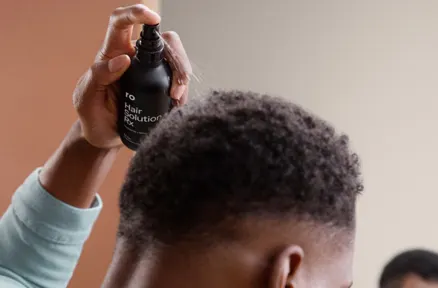Here's what we'll cover
Here's what we'll cover
Here's what we'll cover
The millions of Americans who take antidepressants are probably familiar with common side effects like weight gain and sexual dysfunction. But you may not be aware that some antidepressants also cause hair loss.
Although hair loss is a distressing symptom, these concerns should be balanced against one another. Learning about antidepressants and hair loss may help you make informed choices regarding navigating depression treatment options.
Do antidepressants cause hair loss?
As the name implies, antidepressants are medications used to treat depression. Side effects linked to these drugs include insomnia, nausea, and dizziness, but hair loss (alopecia) is a rare reaction.
Research on long-term antidepressant use found the following to be the most commonly reported adverse effects (Cartwright, 2016):
Sexual difficulties
Weight gain
Emotional numbness
Failure to orgasm
As you can see, hair loss did not make the list. However, a research review comparing hair loss among various antidepressants found people taking bupropion (brand name Wellbutrin) had a higher risk of hair loss compared to others like selective serotonin reuptake inhibitors (SSRIs) and serotonin and norepinephrine reuptake inhibitors (SNRIs) (Etminan, 2018).
Other antidepressants had a lower risk of hair loss with fluoxetine (brand name Prozac) and paroxetine (brand name Paxil, Brisdelle) showing the lowest risk. Among the typical antidepressants, fluvoxamine (brand name Luvox) had the highest risk, but not as high as bupropion (Etminan, 2018).
Is hair loss from antidepressants permanent?
Antidepressants can cause telogen effluvium, a type of temporary hair loss triggered by things like stress and medication. Telogen effluvium occurs when hair follicles in the resting phase fall out too early. Normally, around 85% of a person’s hair follicles are in the actively growing (anagen) phase. The remaining 15% are resting hairs in what’s called the telogen phase. But if you experience telogen effluvium, those roles reverse; this launches up to 70% of hairs into the telogen phase, which is when new hairs push out the resting ones (Hughes, 2021).
The good news is that telogen effluvium usually occurs without any scarring and is typically reversible.
What to know about antidepressants
Of the major classes of antidepressants, SSRIs and SNRIs are the first-line treatment. SSRIs alleviate symptoms by blocking the reabsorption of serotonin in the brain. SNRIs block the reabsorption of serotonin and norepinephrine.
Examples of SSRIs include:
Sertraline (brand name Zoloft)
Paroxetine
Fluoxetine
Escitalopram (brand name Lexapro)
Fluvoxamine
Vilazodone (brand name Viibryd)
Citalopram (brand name Celexa)
Examples of SNRIs include:
Duloxetine (brand name Cymbalta)
Venlafaxine (brand name Effexor)
Levomilnacipran (brand name Fetzima)
Desvenlafaxine (brand name Pristiq)
Milnacipran (brand name Savella)
Other types of medications include monoamine oxidase inhibitors, tricyclic antidepressants, and atypical antidepressants like bupropion.
When to see a healthcare provider
Before starting a new antidepressant, it’s helpful to have a list of questions prepared. As it relates to hair loss, you might want to ask a healthcare professional questions like:
What side effects could the new medication have?
Will the new medication impact hair growth?
If so, is there an alternative drug that doesn’t cause hair loss?
If you’re taking antidepressant medication and notice signs of hair loss or thinning, it’s just as important to talk with your provider—don’t just stop taking these drugs on your own. There are countless reasons for hair loss (like genetics, diet, illness, and stress) so it’s important to differentiate drug-induced telogen effluvium from other issues.
Your provider may reduce or eliminate the drug for several months to see how your hair responds. The caveat here is that this should always be done gradually as opposed to cold turkey. Abruptly stopping these medications can lead to what’s called antidepressant discontinuation syndrome—a temporary flu-like withdrawal reaction to ending a medication (Warner, 2006).
Once people stop taking the drug, they’ll typically see hair regrowth within six months. At this point (or maybe even sooner), your healthcare provider will better understand your hair growth patterns and if additional treatment is necessary.
Research shows that more than 60% of Americans taking antidepressants have been on them for two or more years. Roughly 14% have used the medication for at least 10 years (Pratt, 2011). Judging by this information, it seems safe to say that these medications are here to stay, so it’s important to understand all side effects.
The good news is that if loss of hair occurs, it usually only lasts a few months and is reversible. You can work with your healthcare provider to find an alternative medication or explore other solutions for treating and managing hair loss from antidepressant use.
DISCLAIMER
If you have any medical questions or concerns, please talk to your healthcare provider. The articles on Health Guide are underpinned by peer-reviewed research and information drawn from medical societies and governmental agencies. However, they are not a substitute for professional medical advice, diagnosis, or treatment.
References
Cartwright, C., Gibson, K., Read, J., et al. (2016). Long-term antidepressant use: patient perspectives of benefits and adverse effects. Patient Preference and Adherence, 10, 1401–1407. Retrieved from https://www.ncbi.nlm.nih.gov/pmc/articles/PMC4970636/
Etminan, M., Sodhi, M., Procyshyn, R. M., et al. (2018). Risk of hair loss with different antidepressants: a comparative retrospective cohort study. International Clinical Psychopharmacology, 33 (1), 44–48. Retrieved from https://pubmed.ncbi.nlm.nih.gov/28763345/
Hughes, E. C. & Saleh, D. (2021). Telogen effluvium. StatPearls . Retrieved April 1, 2022 from https://www.ncbi.nlm.nih.gov/books/NBK430848/
Pratt, L. A., Brody, D. J., & Gu, Q. (2011). Antidepressant use in persons aged 12 and over: United States, 2005–2008. NCHS Data Brief, 76 . Retrieved from https://www.cdc.gov/nchs/products/databriefs/db76.htm
Warner, C. H., Bobo, W., Warner, C., et al. (2006). Antidepressant Discontinuation Syndrome. American Family Physician , 74 (3), 449–456. Retrieved from https://www.aafp.org/pubs/afp/issues/2006/0801/p449.html










